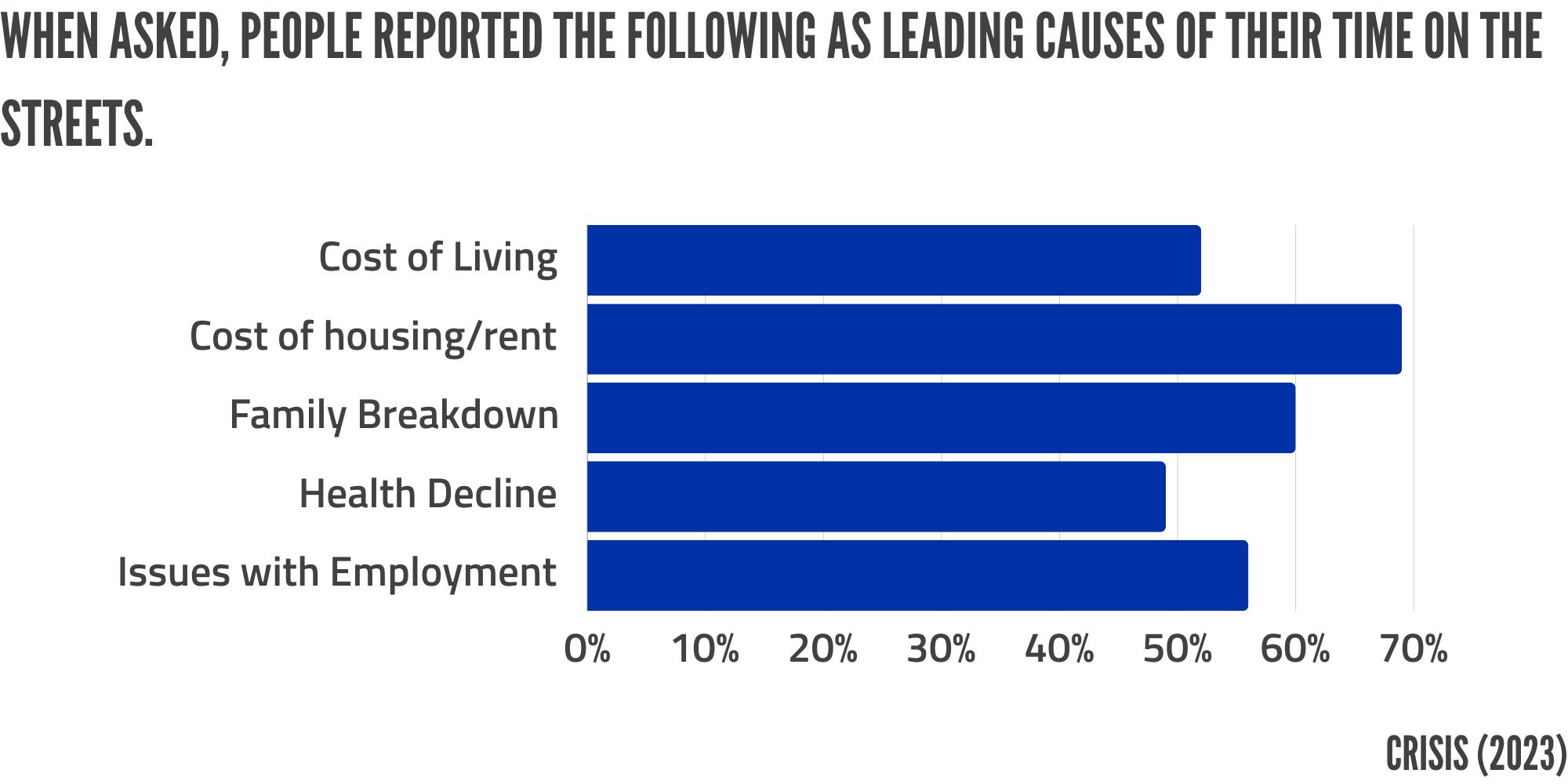The causes of homelessness can include financial, mental and relational issues. But these vary person by person.
These causes often interact and intensify each other’s impact.
Because of this, it’s rare that someone will become homeless for one reason. In fact, our experience tells us that everyone’s casues for facing homelessness are different.
Whether we find someone on a park bench or at our red door, the story of how they got there is always new. But within these stories, there are usually common threads.
At our homeless day centre in London some of the most common causes of homelessness are:

While these are common causes of homelessness and rough sleeping, it’s far from a comprehensive list. It’s also important to remember that these causes can occur in different ways and at different points in a person’s life. They can also change over time.
Childhood factors that can cause homelessness
The likelihood for some of becoming homeless can affected from birth.
The environment you’re born into can play a large role in becoming homeless. Growing up in a underfunded care system, abusive home or a poor area with fewer resources can all increase your chances of living on the streets.
Simply put, this is because a lack of emotional, social and/or financial support can lead to survival becoming your primary concern. When you’re just trying to get through the day, education, building support networks and other important assets become secondary.
This means the most at risk often have weaker support systems in place should anything go wrong.
Identity can also play a role in becoming homeless, despite being completely out of a person’s control. Multiple studies have found that Black people are twice as likely to become homeless compared to people from other racial backgrounds.
The trans community are also highly at risk of homelessness due to discrimination and lack of suitable housing support. In fact, 25% of trans people have experienced homelessness at some point in their lives.
There is little data on what happens when these identities intersect but, what we have seen suggests the risk of homelessness is increased further.
All these factors can occur (or co-occur) during childhood. The trauma of this can stay with people even if the issues themselves go away.
Growing up
If you’ve experienced a rough childhood, you’re likely to want to escape it regardless of the consequences.
We worked with Kerri who chose to run away from the care system. She had no family to turn to and so became street homeless at just 13 years old.
Children and young people are incredibly vulnerable to harm on the streets. We know experiences of verbal, physical and sexual violence are very common when sleeping rough. This could lead to additional traumatic experiences which can make it harder to find and accept suitable support.
Data source: CHAIN Report 2022/23Adulthood – when the causes of homelessness come to a head
Even if a person has managed to recover from a childhood full of challenges, many factors can still cause harm.
For example, we’ve all seen the devastating crash in the housing market in recent years. While most of us are facing higher costs, only some are in a financial position to cope with them. Many others are struggling, which could explain why 1 in 50 Londoners are now homeless.
If a person is living payday to payday a setback like increased rent could push them over the edge into homelessness.
Even a person whose seemingly lived a ‘perfect life’ could have their circumstances shift. The partner they live with could become abusive. Their mental health could rapidly decline. War could make them a refugee, as we’ve seen happen to many Ukrainians and Afghans over the last year.
These causes of homelessness could impact anyone with little or no warning.
And once you’ve been made homeless by personal circumstance or larger structural issues, it can be hard to escape.
A vicious cycle
Homelessness can be a very tough cycle to break. In some ways, homelessness itself is a cause of homelessness.
Let us explain…
While sleeping rough, a person’s health often declines. This makes your ‘case’ more complicated. Now, you’ll need support accessing a GP or mental health specialist which not all homelessness services offer.
This lack of support could make you feel more isolated. In order to cope, you might turn to alcohol or drugs as healthy alternatives are inaccessible. Recovering from this could again require specialist support, which The Connection offers, but isn’t readily available to many.
All this can create a harsh cycle that is hard to break away from. We’ve supported many people who have struggled with homelessness for years, like Sean who had been living in his car on and off for over 20 years when we met him.
Without suitable support that addresses the root causes of homelessness, rough sleeping and insecure housing, as well as the symptoms, homelessness will continue to affect hundreds of thousands of people across the UK.
How you can make a difference
While the causes of homelessness are deeply ingrained into our society and will take a long time to overcome, we’re working to prevent homelessness while supporting those who have fallen through the cracks.
This includes:
If you would like to support this work, please tap the image below.

